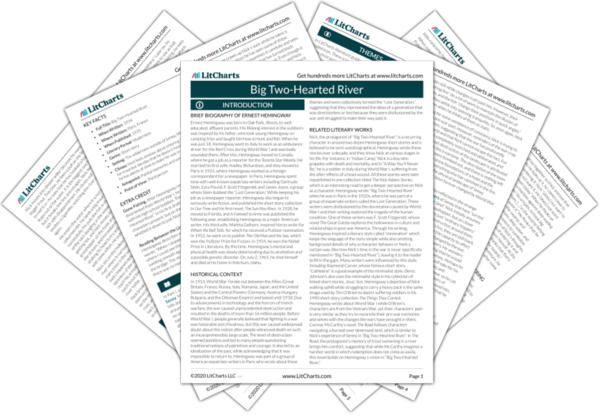The murky, tangled swamp is a reflection of Nick’s dark memories and unresolved emotions. While nature in the story is mostly a rejuvenating and hopeful force, the swamp, in contrast, comes across as uncontrollable and terrifying. At the end of Part I, when Nick is tired and ready to fall asleep in his comfortable tent, “The swamp [is] perfectly quiet,” suggesting that at that moment his mind is calm and empty of disconcerting thoughts and memories. However, in Part II, the swamp is an ominous presence when Nick is fishing on the river. Its tree trunks are “close together” and seem impenetrable. Nick is constantly aware of the swamp, and repeatedly thinks that he does not want to go inside it, which suggests that he is afraid of it. Throughout the story, Nick attempts to avoid situations that might trigger a strong emotional response in him—he suppresses memories of his friend Hopkins (who is implied to have died in World War I), reigning in his emotions and struggling to control his reactions. It seems like he feels he will lose control if he enters the swamp. In order to control his emotions, he needs to control his environment much like he controls his emotions—whether through making an elaborate camp or dinner, or successfully landing a trout—but at the swamp, he fears he will have no control. There, among the low-growing trees, darkness, and deep water, he thinks that fishing will be a “tragic adventure.” However, toward the end of the story, Nick thinks that there are “plenty of days coming where he could fish the swamp,” suggesting that he is optimistic that the fishing trip by the river will fortify him so he will be resilient enough to face the challenge of the swamp, and thus, to confront his painful memories.
The Swamp Quotes in Big Two-Hearted River
Ahead the river narrowed and went into a swamp. The river became smooth and deep and the swamp looked solid with cedar trees, their trunks close together, their branches solid. It would not be possible to walk through a swamp like that. The branches grew so low. You would have to keep almost level with the ground to move at all. You could not crash through the branches. […]
He wished he had brought something to read. He felt like reading. He did not feel like going on into the swamp. […]
Nick did not want to go in there now. He felt a reaction against deep wading with the water deepening up under his armpits, to hook big trout in places impossible to land them. In the swamp the banks were bare, the big cedars came together overhead, the sun did not come through, except in patches; in the fast deep water, in the half light, the fishing would be tragic. In the swamp fishing was a tragic adventure. Nick did not want it.

Unlock explanations and citation info for this and every other Big Two-Hearted River quote.
Plus so much more...
Get LitCharts A+









